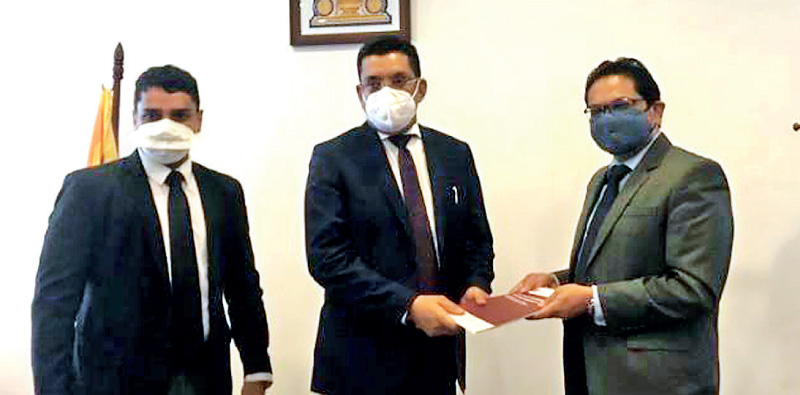Saturday Feb 21, 2026
Saturday Feb 21, 2026
Friday, 30 July 2021 02:31 - - {{hitsCtrl.values.hits}}

Verité Research Executive Director Dr. Nishan de Mel (right) presenting the report to Justice Minister Ali Sabry
Verité Research yesterday handed over a report on Sri Lanka’s due process and preparedness during emergencies to Justice Minister Ali Sabry.
The purpose of the report was to study the Judiciary’s response to the challenges of COVID-19 and evaluate whether the responses adequately protected due process. The Sri Lankan response was analysed against the judicial responses of selected countries, such as India and Singapore, as regional and benchmark comparisons.
The analysis revealed that the Sri Lankan judicial response to COVID-19 challenges lacked urgency and had several shortfalls, resulting in four serious issues:
1. Large volumes of cases have been postponed due to the slow adoption of alternatives to in-person court proceedings.
2. Alternatives to in-person proceedings (such as virtual hearings) are conducted without proper guidelines on ensuring fairness.
3. There is an uncertainty on how cases are prioritised due to the lack of guidelines on prioritising urgent cases.
4. There is restricted access to lawyers by persons in custody, due to failures in implementing alternatives to in-person consultations in places of custody.
The report also goes on to highlight some of the lessons that Sri Lanka can learn, particularly from the responses of other judiciaries, on how to be better prepared for further public crises.
The report was published on 18 June at a launch event with the participation of representatives of the Bar Association of Sri Lanka, prominent President’s Counsel and other senior legal practitioners in Sri Lanka. The report can be accessed at www.veriteresearch.org/publications.